If you are thinking about starting a franchise business, it is necessary to have a franchise agreement in place. With this contract, you can establish a proper franchise system and recruit franchisees to operate their businesses under your brand name and business model. It is advisable to use a template when creating a franchise agreement. You can customize it to suit your specific business needs. However, ensure that you seek legal advice before modifying it. In this article, you will learn more about the agreement, the benefits of using a template, the components to include, and the different types you can use.
Understanding Franchise Agreements
A franchise agreement is a legally binding contract between a franchisor and a franchisee highlighting their roles, rights, and responsibilities. It serves as the foundation between the owner of the established business and the individual or entity seeking the rights to operate under the franchise unit. Moreover, it incorporates the obligations relating to selling your company’s intellectual property and licensing rights.
You can inform the franchisee of the terms and conditions of using your trademark and support system. This may include the franchise term, fees, royalties, intellectual property rights, training and support, territory and exclusivity, and dispute resolution methods. Some examples of businesses that use this agreement include fast food and chain restaurants, health clubs, convenience stores, retailers, financial advisors, travel agencies, real estate companies and health care providers.
Purpose of a Franchise Agreement Template
When preparing a franchise agreement, it is advisable to use a template. This pre-designed document with a standardized format and language act as a guide for creating the contract. With its structured outline, you will save time, guarantee legal compliance and maintain consistency. You can include all the required information, such as rights and obligations, fees, payment, dispute resolution, and intellectual property.
It can also be customized, by a qualified attorney, to suit the franchising requirements. The attorney should consider your needs and the franchisee’s needs. Moreover, it should adhere to the franchise industry’s laws, regulations and standards. Regarding consistency, the template guarantees clarity and uniqueness across different franchise contracts within the same system.
Free Templates
Given below are franchise agreement templates:
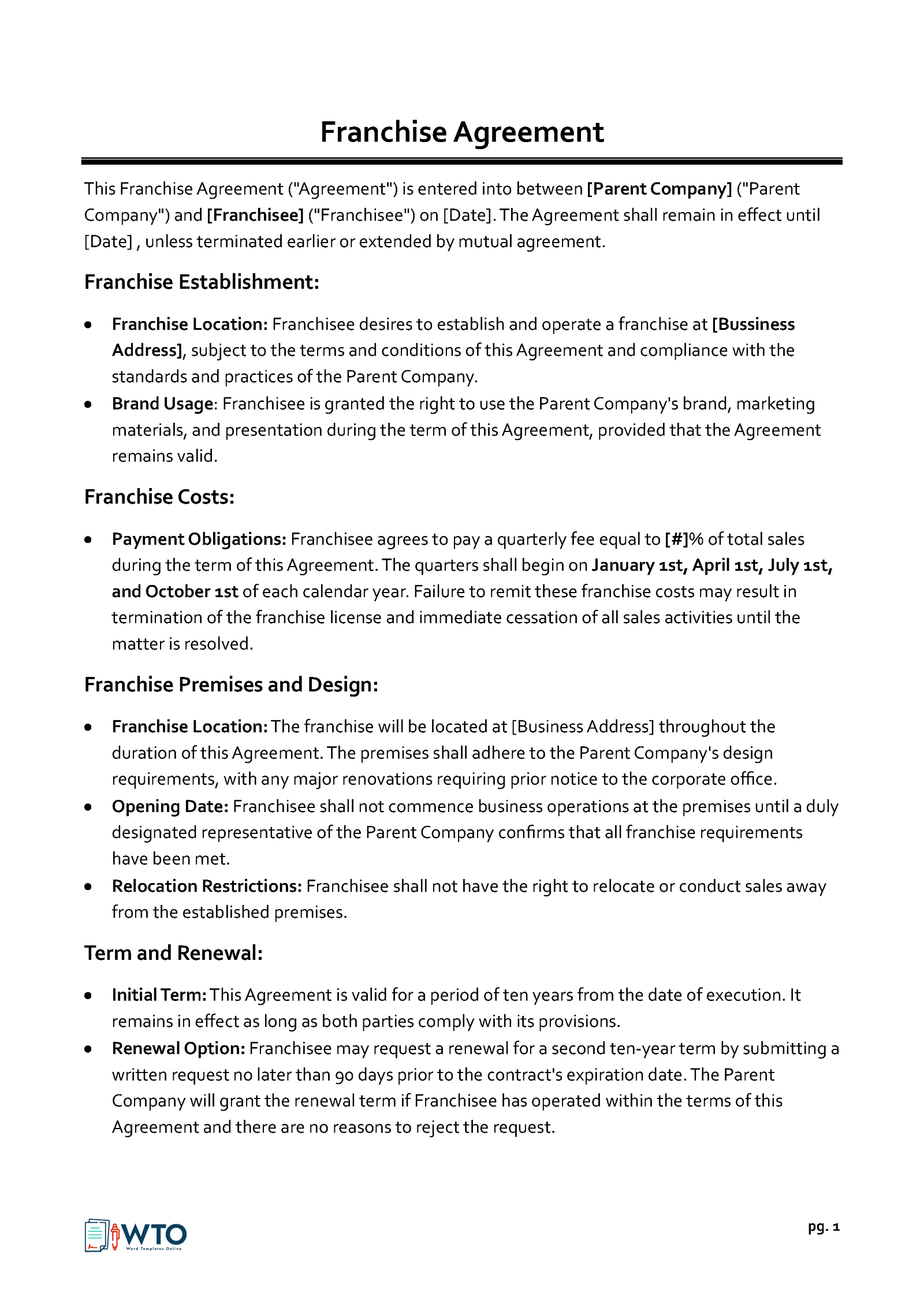
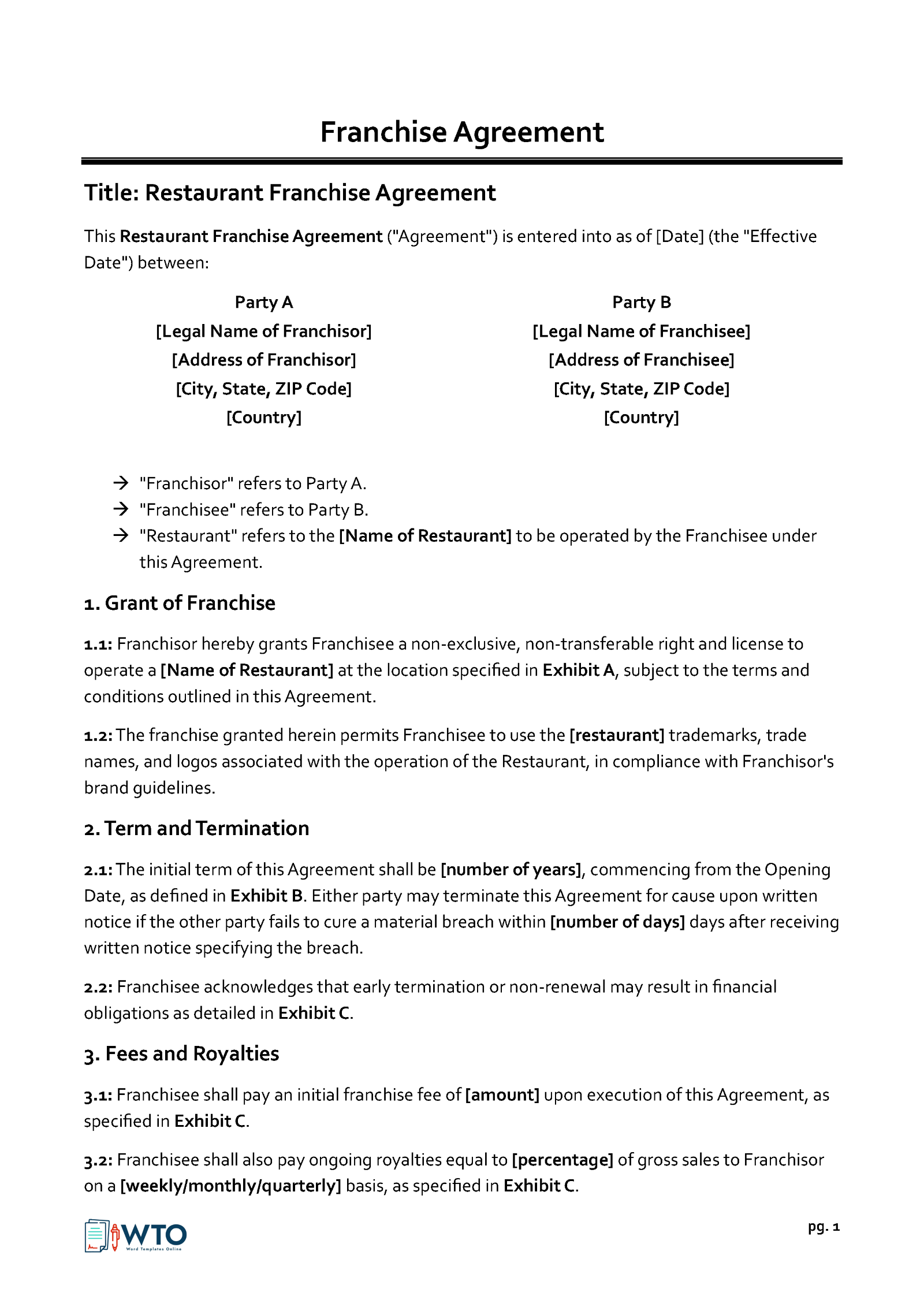
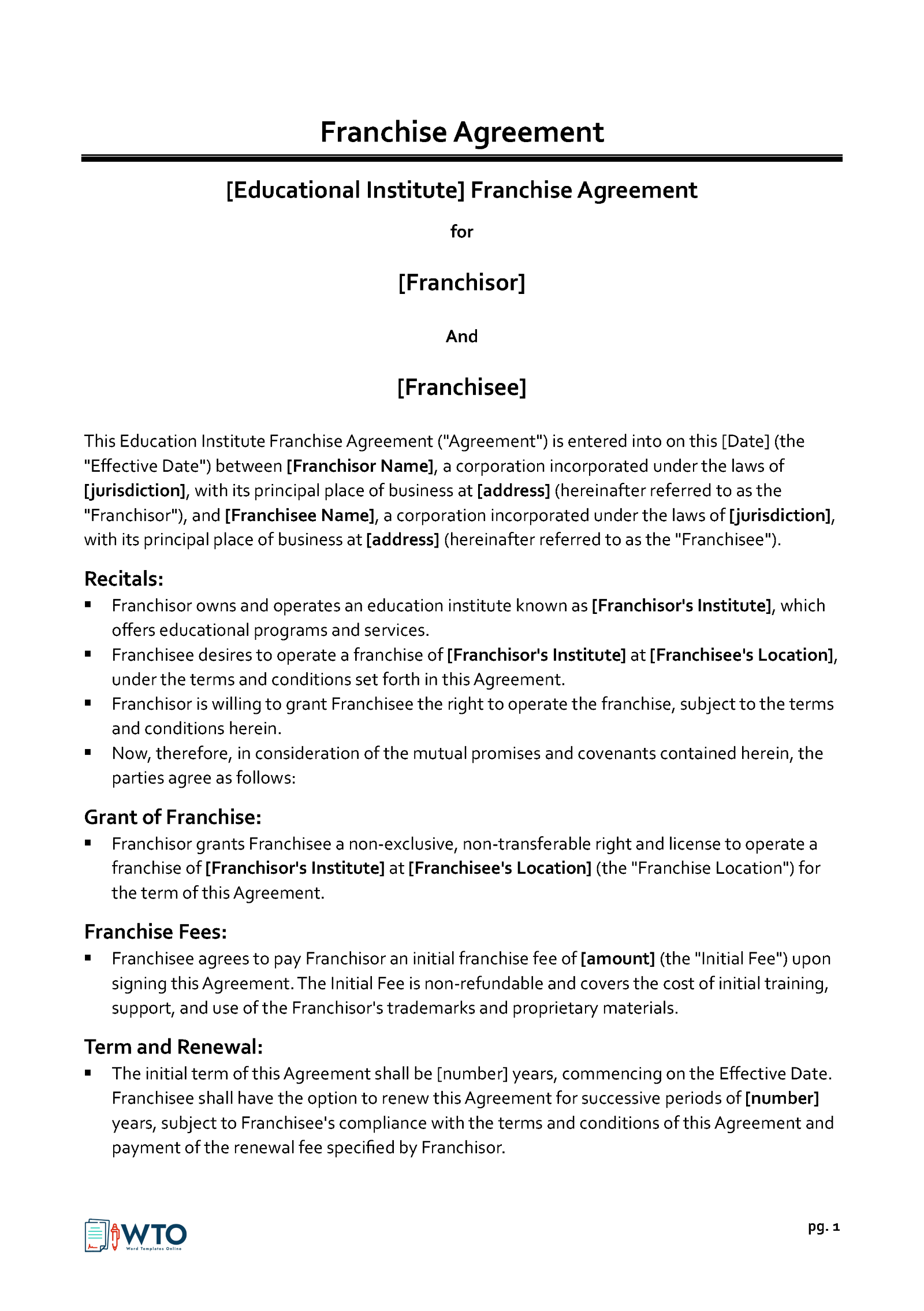
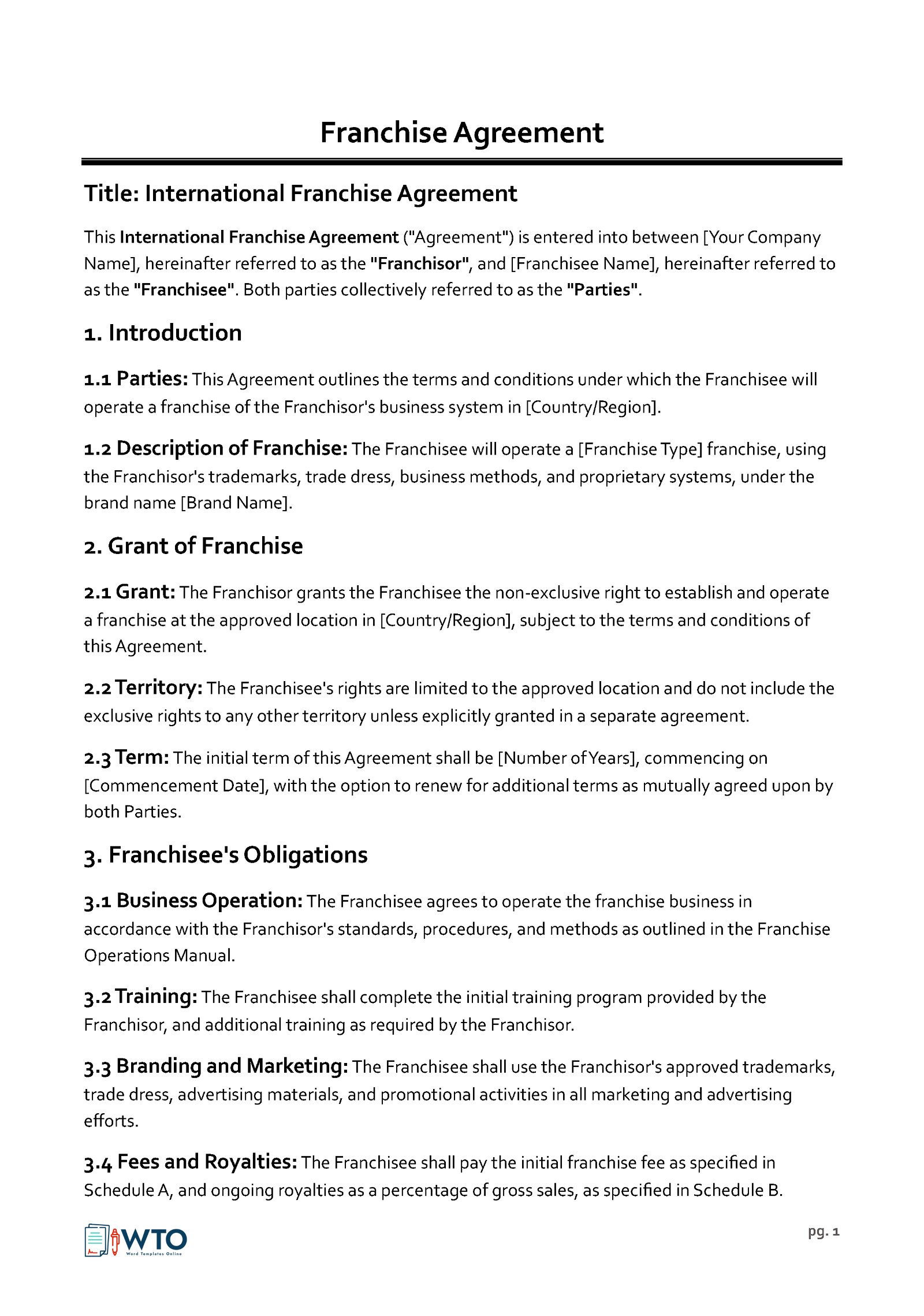
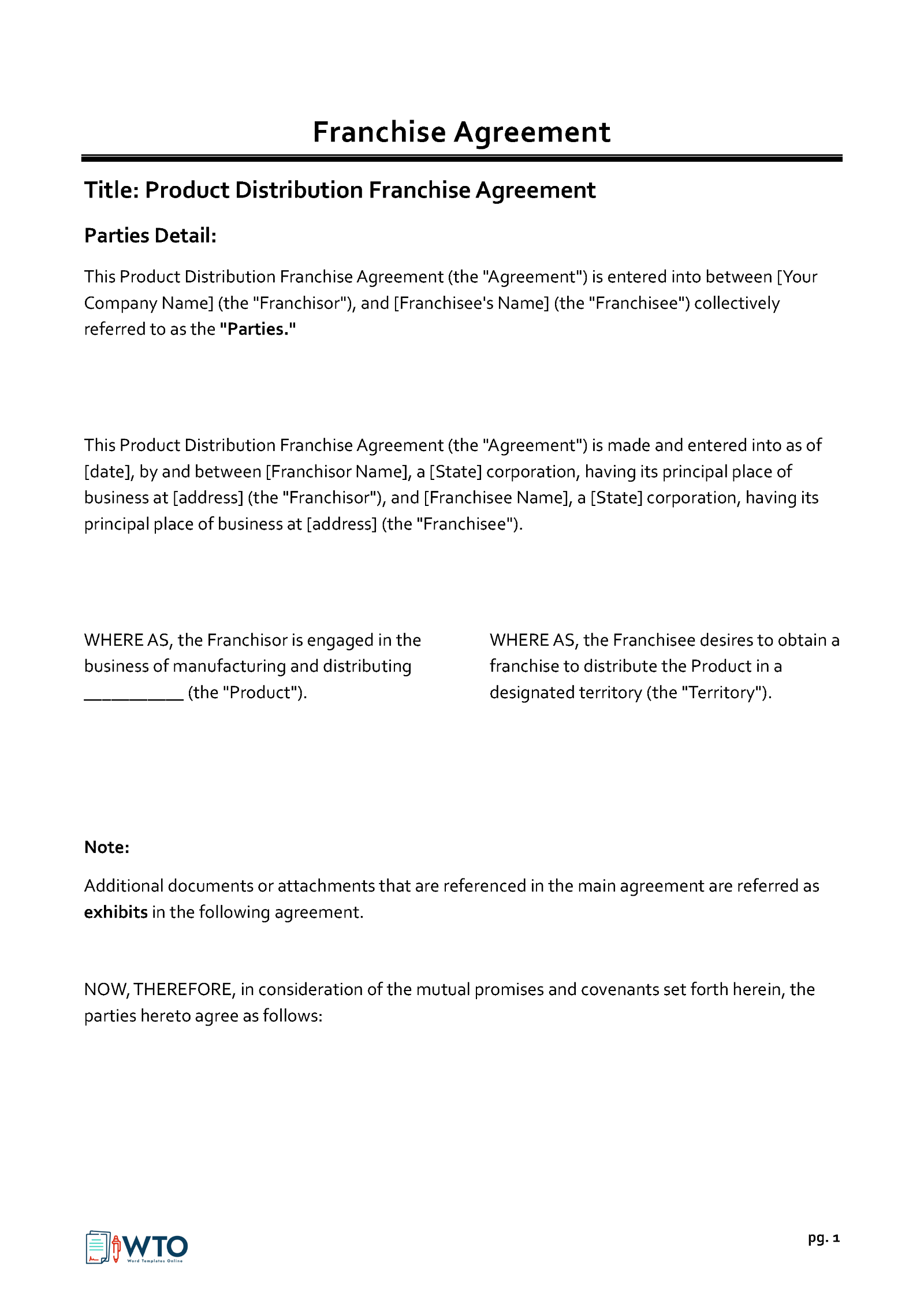
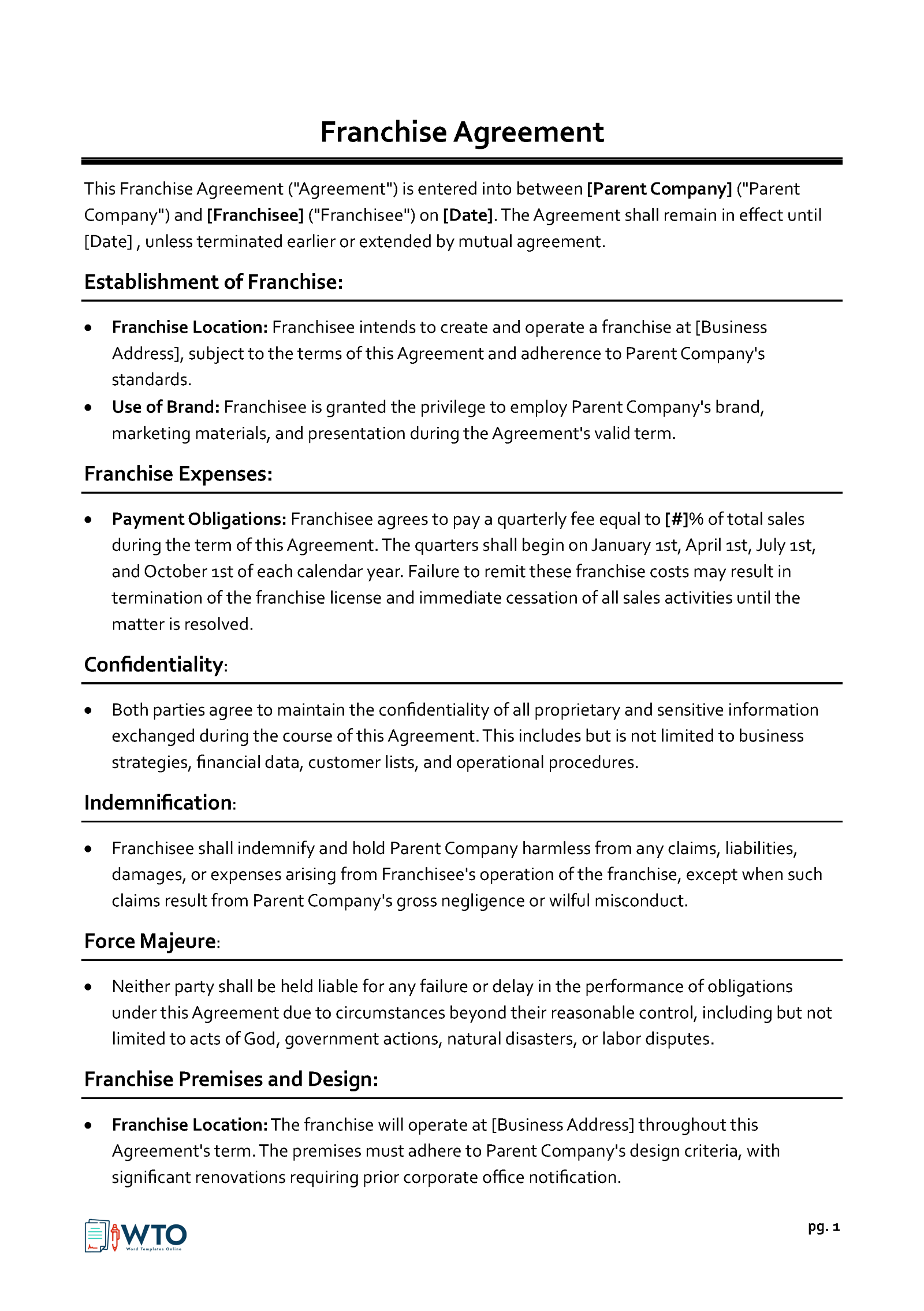
What is the Difference Between a Franchise Agreement and a License?
A franchise agreement differs from a license as it covers a broader business relationship. In contrast, the latter covers a narrower spectrum that mainly focuses on the permission to use intellectual property.
A franchise agreement creates the foundation between you and a franchisee. It details the use of your brand, business model, and support systems. You have control over the franchisee’s operations. Apart from intellectual property, it also includes ongoing support, different business elements and operational involvement, such as marketing, training, and standards enforcement.
On the other hand, licensing involves having the right to use specific intellectual property. Moreover, it is limited in scope and duration and does not involve ongoing support or control over business operations. With the focus being intellectual property, having a license means being able to use patents, copyrights, or trademarks.
What to Include in a Franchise Agreement Template
A well-crafted agreement will establish clear guidelines for both parties to prevent conflicts and guarantee a successful franchisor-franchisee relationship.
You should include several components in your template to achieve this:
Basis for agreement
For this section, you should include a detailed statement stating the arrangement’s purpose and foundation. It should outline the mutual understanding of the franchisee’s agreement to use your already established business system, proprietary rights, and trademarks.
Grant for franchise
This section will explain that you are granting the franchisor the right and license to operate a franchise location using your business system and trademark. It will also highlight that the grant is non-exclusive (not restricted to the individual or entity) and must adhere to the terms and conditions mentioned in the agreement.
Franchise fee
In this section, you will indicate the fee the franchisee should pay you. This includes the amount, timing of payment (one-time or recurring), and other details such as financing arrangements or payment schedules.
Franchised location and designated area
The template should also include this section to mention the specific location of the franchisee’s business operation. It should also include provisions related to the designated area, including exclusive or non-exclusive franchisee’s rights within that location.
Initial franchise fee
This section focuses on any initial fee the franchisee must pay besides the standard franchise fee. This fee is meant for specific services or support you will offer the franchisee during their initial setup and launch.
Training
In this section, you should highlight details of your training obligations, such as the program’s type, duration, and location. You can also include the initial training of the franchisee and their employees. The idea is to make everyone aware of what is expected from them for a practical and operational business.
Development assistance
This section focuses on the ongoing support you will provide to the franchisee. This may include site selection, architectural standards, design guidelines, lease negotiation, and obtaining permits or licenses.
Operations manual
This section of the template is used to mention that you have provided the franchisee with an operations manual. This manual contains the standardized procedures, guidelines, and other specifications regarding the franchise business. This section will also emphasize the importance of observing the manual and adhering to any updates you may provide.
Royalties
The agreement template must have a section for ongoing royalties. It should specify the percentage of gross sales you should receive from the franchisee. In addition, it should highlight the frequency and payment method of the royalties. You should also include the franchisee’s responsibility regarding accuracy in making payments and reporting gross sales.
Advertising
This section should highlight your responsibility concerning advertising and marketing the new franchise. It can include an advertising fund, marketing materials, and approval for local advertising initiatives.
Quality control
This section will contain content that mainly focuses on the franchisee. They should be willing to commit to your brand’s quality, standards, and reputation. Therefore, this section will highlight their responsibility to observe your quality control guidelines, audits, and inspections.
Term
This section of the template should focus on the initial term of the franchise business. It should highlight the start and end dates of the agreement. It should also contain details on renewal rights, including the options, conditions, and renewal process.
Default and termination
The template must include a section that can be used to define the circumstances allowing you to terminate the agreement. They include criminal conviction, abandonment, insolvency, misuse of marks, failure to make payments, repeated non-compliance, unauthorized disclosure, and other contract breaches. These circumstances will also be considered as grounds for default.
Restrictive covenants
This section highlights any restrictive covenants (clauses that prevent, prohibit, restrict or limit specific actions) that the franchisee must adhere to during and after the agreement period. These restrictions may include non-compete provisions prohibiting the franchisee from operating a similar business within the exact geographical location for a particular period.
Insurance
This section specifies the insurance requirements and the type of insurance coverage that the franchisee must have while operating the business. This may include general liability insurance, worker’s compensation, and property insurance. You can also include provisions that the franchisee should name you as an additional insured on the policies and provide proof of coverage.
Governing law
This section should highlight the governing law and jurisdiction of the franchise agreement. The details should include the state or country whose laws will govern the agreement’s validity, enforcement, and interpretation.
Modification
In this section, please clarify that the agreement can only be modified in writing and with signatures from both parties. This means oral promises made outside the written agreement will not be considered amendments. However, if these presentations are incorporated into a written modification, they will become binding.
Entire agreement
This section highlights that the franchise agreement is based on the understanding between you and the franchisee. Therefore, it replaces any other prior written or oral agreements. That means that it nulls and voids any representations, warranties, or promises that were made and are not included in the agreement.
Effective date
This section of the template is used to add the actual date when the contract becomes effective. Since this is a formal document, write the entire date in words. You can also include other provisions to be considered before the agreement takes effect, such as the execution of ancillary documents or the fulfillment of specific conditions.
Attorneys’ fees
The template should also include a clause that protects the prevailing party in case of a legal dispute or arbitration from the franchise agreement. This party shall be entitled to recover reasonable attorney fees and costs incurred in implementing their rights or defending against claims.
Injunctive relief
In this section, you should acknowledge that the non-breaching party is entitled to seek injunctive relief and any other remedies available at law or equity in case of a breach. Ensure you emphasize that violating the franchise agreement may cause permanent and irreversible harm.
No waiver
There should be a clause emphasizing that the failure of either party to exercise a right or enforce a remedy under the agreement does not constitute a waiver. However, for any waiver of a provision to be valid, it must be in writing and signed by the waiving party.
No right to set off
In this section, you should mention that the franchisee has no right to set off (the legal right of a debtor to reduce the amount owed to a creditor) any amounts owed to you against any alleged damages or claims. They can only do this if such a provision has been included in the agreement.
Invalidity
This section should specify that if any provision in the agreement is determined invalid, illegal, or unenforceable by a court of competent jurisdiction, the other provisions will not be affected. They will remain valid and enforceable according to the governing law.
Notices
This section of the template is used to outline the requirements that you and your franchisee must observe when giving notices. This section should also specify the delivery method of the notices, such as certified mail, personal delivery, or email. Moreover, you should include the addresses where the notices should be sent.
Payment of taxes
You should include this section as it focuses on the franchisee’s tax responsibility. The franchisee should adhere to all applicable tax laws and pay all taxes due on time. This includes all taxes arising from the franchise operation, such as income, property, and sales taxes.
Signatures
This section of the template should include signatures from you and the franchisee. As the authorized parties, signing the document means that you agree with the terms and conditions of the franchise agreement.
Note: Including all these key elements when preparing your template is essential. And although that is necessary, you are also advised to consult a franchise attorney to ensure that your document complies with relevant state and federal laws and regulations of franchising. Such an attorney will also help you to customize the document to suit your business requirements.
4 Most Commonly Used Franchise Agreement Templates
There are various templates that you can use to prepare a franchise agreement. Whether you want to download free and customizable ones online or create them yourself, ensure that they suit your business model and industry.
Here are some commonly used templates:
Retail franchise agreement template
This document is meant for retail-based franchises such as clothing stores, restaurants, and convenience stores. It usually includes additional provisions relating to inventory management, marketing requirements, store design, and other industry-related requirements.
Service franchise agreement template
This template is used by service-based franchises like cleaning companies and fitness centers. The provisions in these templates are unique and service-oriented. They may include performance standards, service delivery specifications, and customer relationships.
Product distribution franchise agreement template
Franchise businesses that distribute products use this agreement template. Some of the provisions related to product distribution include quality control, marketing support, product sourcing, and inventory management.
International franchise agreement template
If you are trying to expand your franchise system into the international market, you need a template to prepare an effective agreement. The special provisions in this template that make it suitable include cross-border legalities, cultural nuances, currency exchange, and intellectual property protection.
Legal Factors to Consider for Creating a Franchise Agreement Template
It is crucial to consider the various legal factors in the franchising system to ensure that your agreement template complies with the relevant laws and regulations.
Some of these critical legal aspects that you should have in mind include:
Franchise disclosure requirements
An example of the franchise disclosure law is the Federal Trade Commission’s Franchise Rule in the United States. You must comply with these disclosure laws by providing potential franchisees with a Franchise Disclosure Document (FDD). If you are using a template to prepare the agreement, ensure that it has all the disclosures and observes the legal conditions of your particular jurisdiction.
Intellectual property protection
The template must help in clearly defining your intellectual property rights, such as trade secrets, patents, trademarks, and copyrights. It would be best to mention which assets the franchisee can use alongside the restrictions. It is also essential to list the franchisee’s obligations regarding protecting and maintaining your intellectual property.
Fee structure and financial considerations
You must provide a section to include details of the franchisee’s financial obligations, including fees, royalties, and advertising contributions, in your template. Ensure you highlight the payment terms, methods, and any applicable penalties for late or non-payment. Always observe the franchise fees and financial disclosures.
Compliance with laws and regulations
Your agreement template should include provisions that oblige the franchisee to comply with all applicable laws, regulations, and industry standards. The main focus should be health and safety, employment, consumer protection, and advertising.
Review by a franchise attorney
Finally, always hire a franchise attorney to review and customize your agreement template to ensure you observe all your jurisdiction’s franchise laws and regulations. With an attorney, they can guarantee legal compliance and protect you and your franchise system while modifying the template to suit your specific needs.
Summary
A franchise agreement is an important legal document that outlines the terms and conditions of a franchisor-franchisee relationship. It is advisable to use a template when drafting this agreement to ensure that you include all the essential components, such as rights and obligations of both parties, intellectual property rights, provisions for termination or renewal, and many more. You should consult a qualified franchise attorney to review and customize your document. The importance of this agreement is to allow for smooth operations and limit disputes. Therefore, seeking legal advice before signing any franchise agreement is vital for your business. Finally, ensure you protect your interests by creating an effective and comprehensive agreement.












